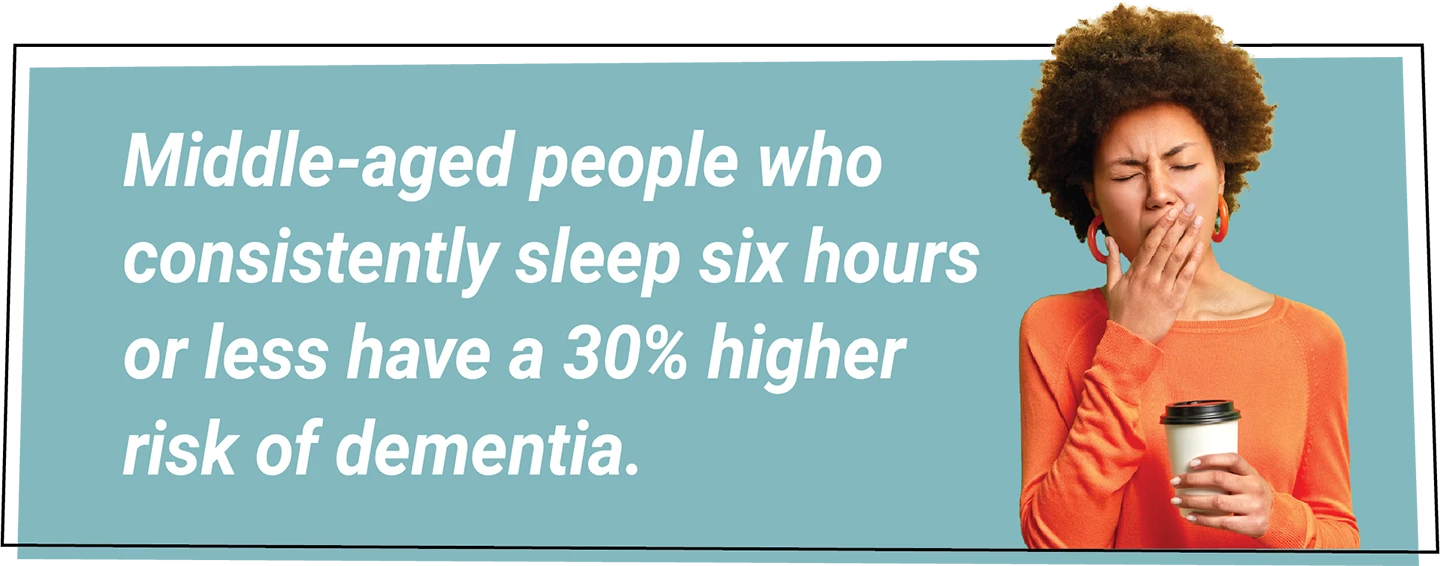
Day 11: The Perfect Rest Stop
Sometimes it’s hard to decide what to do when there’s a large stretch of road ahead. Do you wake up early to beat traffic, keep driving after nightfall or pull over and rest at your favorite hotel chain?
We’d strongly suggest stopping, as getting less than six hours of sleep per night has been linked to a 33% increased risk of car crashes. But sleep is just as important for longevity as it is for alertness behind the wheel.
The National Sleep Foundation recommends that adults get seven to nine hours of sleep per night, but many of us struggle to reach that goal. Research suggests that 40% to 70% of Americans suffer from chronic sleep issues, but many of those are undiagnosed because we don’t talk to our doctors about it.
And the health hazards extend beyond potential car accidents.
Sleeping less than six hours per night is linked to high blood pressure, obesity, heart disease, type 2 diabetes, weight gain, mood disorders, lower immune function, decreased metabolism, heightened pain sensitivity, premature death and dementia.
One 25-year study found middle-aged people who consistently slept six hours or less had a 30% higher risk of dementia. And other studies agree, reporting that both people who chronically rely on sleep medication and those who struggle to fall or stay asleep several nights a week are also more likely to experience cognitive deterioration.
These risks are especially high for people with pre-existing conditions. For those with high blood pressure and diabetes, sleeping less than six hours doubled the risk of death, and the risk tripled for individuals with a history of heart disease or stroke. However, maintaining consistent sleep patterns is also important.

Researchers suggest going to bed and waking up at the same time every day because erratic schedules can raise the risk of high blood pressure by up to 85%. Additionally, oversleeping—defined as 10 or more hours per night—also can lead to mental health issues and a higher body mass index.
And we get it. No one is happy while yawning at the wheel, so it’s important to figure out what’s keeping you up when you finally turn in for the night.
Using caffeine, nicotine, alcohol or electronics too close to bedtime can detour our ability to fall and stay asleep, but we also can be disturbed by noise, temperature and our beloved pets.
Additionally, our sleep patterns often change as we grow older. We tend to feel sleepy earlier and wake up sooner, but we also spend less time in deep sleep and more time in light sleep as we age. That doesn’t even account for side effects or medication or conditions you may already have, such as sleep apnea, restless leg syndrome, chronic pain or anxiety.
So, what’s the superager hack for sleep and longevity?
According to a 2024 study, adhering to five sleep milestones can decrease the risk of cardiovascular disease, cancer and all-cause mortality by up to 30%. Those are:
- Sleeping seven to nine hours per night (optimal sleep duration),
- Reporting “usually” or “always” having a good night’s sleep (high sleep quality),
- Rarely experiencing trouble falling or staying asleep (consistent sleep timing),
- Not frequently using sleep medications (low dependence) and
- Feeling well-rested and alert during the day (adequate daytime alertness).
Such sleep hygiene could increase men’s life expectancy by up to 4.7 years and women’s by 2.4 years, but what else can you do to sleep well?

Every day during the series, we'll share a few tips for a healthier journey. Whether you've drifted off track, need a tune-up or want to stay on course, we can help.

Getting Back on the Road
If your sleep habits have veered off road, there are some simple ways you can course-correct. First, start by sticking to a sleep schedule—which means going to bed and waking up at the same time, even on weekends and vacations. In addition, make sure your room is dark and cool. Sleep specialists claim the “Goldilocks zone” when it comes to temperature is between 60 and 67 degrees. And don’t forget to keep those daytime naps to 30 minutes or less. People who sleep more than 10 hours per night and nap during the day are at an 85% increased risk for strokes.

Tune-Up
They call it a "rest stop" for a reason. So, even if you’re going to bed at the same time every night and keeping your room dark and cool, it doesn’t necessarily mean you’ve established a truly calming bedtime routine. Your diet and exposure to blue light from electronic devices can keep you awake, so make sure to avoid consuming anything at least three hours before bed and put away those screens at least an hour before you go to sleep.

Cruise Control
Even if you’re picking a good time to pull over for quality rest every night, sleep is impacted by more than your bedtime routine. What you do during the day also matters. That’s why it’s important to exercise at least 20 minutes per day. High-quality exercise can lead to deeper and more restful sleep, potentially reducing symptoms of insomnia and improving overall health. Exercise also helps your body regulate temperature, reduces stress and helps lower instances of insomnia.


